The Who: Who’s Next / Life House box set review
Alexis Petridis on the 10CD+blu-ray package
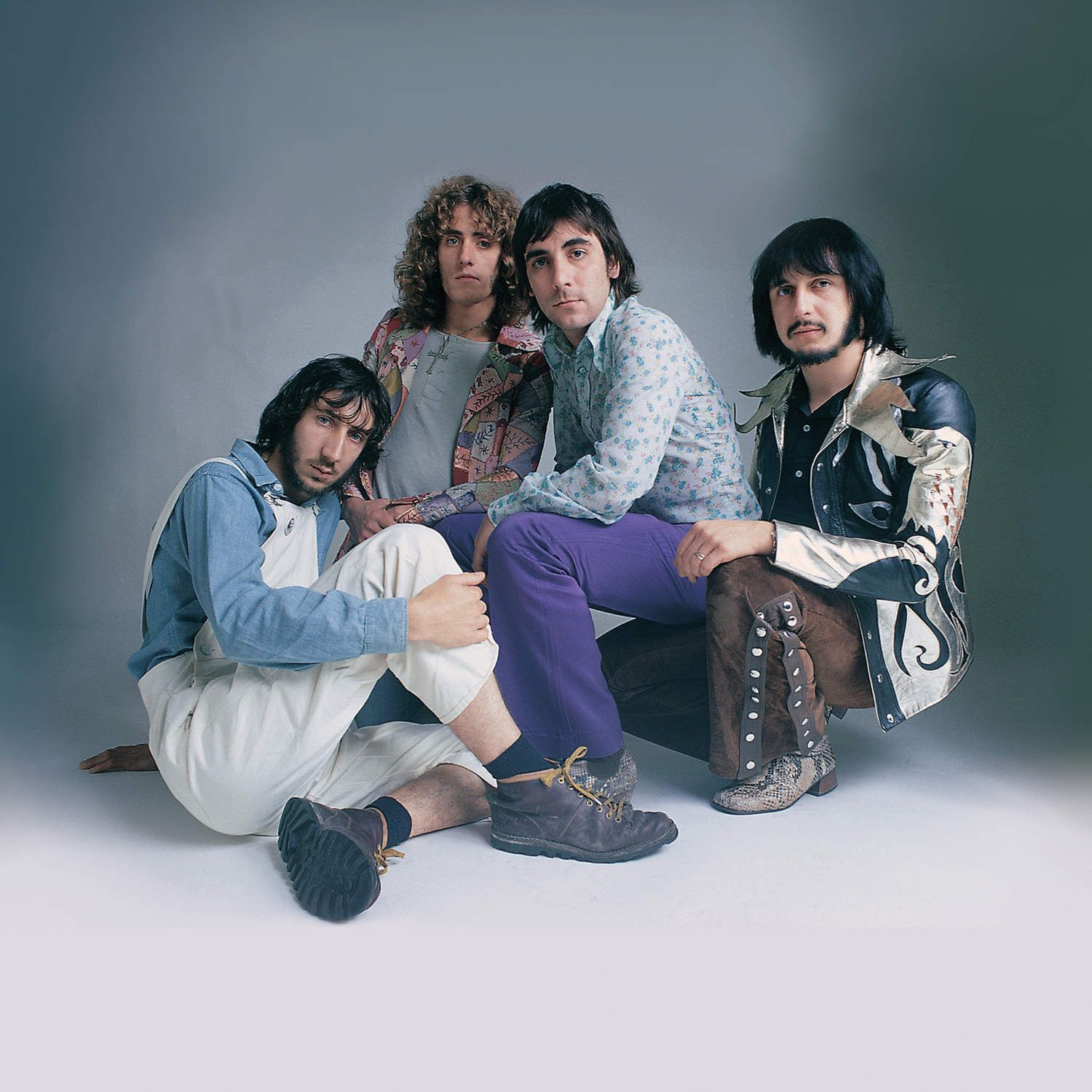
Read Alexis’ review • Watch the SDEtv unboxing video
All great lost albums carry a mythology around them, but the mythology around The Who’s unfinished 1971 album Life House might be the most startling and persuasive of the lot. Life House wouldn’t have been just an album but an act of quite astonishing clairvoyance, predicting the internet, crowdsourcing and virtual reality. It’s a mythology that has been burnished by Life House’s author: most artists with great lost albums in their catalogue try to play them down, eager not to have the rest of their career overshadowed by what ifs, but the what ifs of Life House seem to have niggled away at The Who’s Pete Townshend ever since he abandoned the project. This box set is the latest in a lengthy string of attempts to bring Life House back to life. He lobbied The Who to resurrect the idea in 1977 and attempted to turn it into a film in the early 80s. He based his 1993 solo album Psychoderelict on some of its ideas. He co-authored a Life House radio play in 1999; released a 6CD box set, Life House Chronicles and performed two Life House live shows a year later and reworked parts of its concept into computer software, a novella and Wire And Glass, the six-part “mini opera” that concluded The Who’s 2006 album, Endless Wire.
Perhaps the quality of the music The Who recorded in 1970 and ’71 has something to do with Townshend’s inability to leave Life House alone. The album The Who released in Life House’s place, shorn of its concept and a lot of its songs, was Who’s Next, arguably their artistic pinnacle: what if – somewhere within the umpteen demos, live recordings and studio outtakes collected here – there lurks an even better version of their best album? Or perhaps it has something to do with thwarted ambition. Retold in the box set’s 100-page book, the saga of Life House’s making is so extraordinarily convoluted and confused, so filled with cross-purposes, misunderstanding and – occasionally – straightforward sabotage, that this writer confesses he ended up frantically taking notes: not as preparation for this review, but just in a desperate attempt to try and keep up with what was going on.
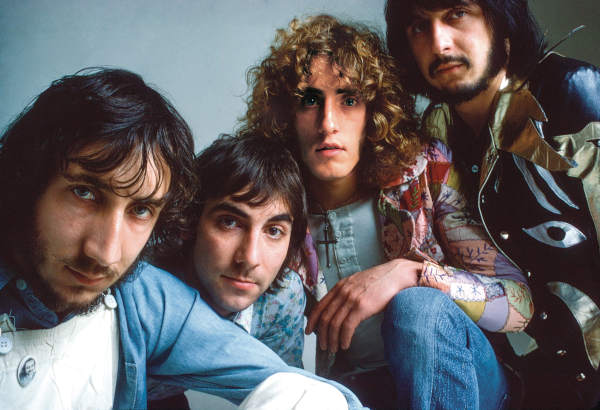
Over the course of a year, The Who’s next project turns from a TV film, into a new album with an accompanying stage show, into an EP, into a feature film, into a double album with each side devoted to one member. It finally becomes a lengthy residency at The Young Vic, which would be filmed and would ideally have required the same audience members to attend every show and was supposed to culminate in said audience members becoming so immersed in the new music The Who were playing that they would spontaneously come forward and offer their personal stories to Townshend. He would turn them into further songs, and into characters in a scripted drama about a future dystopia in which music is banned and humans are linked to a global computerised network called The Grid which pumps tailored entertainment into “experience suits”, thus keeping them satiated and apathetic. This would be melded with the live footage – intended to represent the quest for “a musical note that holds the basis of existence”, the discovery of which would cause “complete devastation” and destroy The Grid’s stranglehold – and thus become Life House, complete with accompanying album. At least I think that’s right. There seems every chance no one knew for certain even at the time. The Who’s other members were confused, the band’s two managers were befuddled by drugs, several film and theatre executives seem to have thought they were getting a version of Townshend’s previous rock opera Tommy, rather than something new. The best moment in the book may come when Townshend furiously protests that “when people say I didn’t know what the fuck I was talking about, what they’re actually doing is revealing their own complete idiocy because the idea is SO FUCKING SIMPLE”, which, with all due respect, sounds remarkably like something you’d say if you had succeeded in completely confusing yourself.
Townshend’s notes offer a lot of explication of the Life House songs’ meaning, which is often revelatory: it turns out that ‘Won’t Get Fooled Again’, usually framed as his bitter response to the late 60s counterculture’s demands for revolution – a howl of disenchantment at the prevailing order that’s cynical enough to suggest the alternative probably won’t be any better – was actually intended as the voice of those happy in Life House’s dystopian world, satiated by their “experience suits”, which more or less completely changes its meaning: it’s actually a song about apathy, rather than distrust. That said, the box set might be best approached putting Life House’s plot to the back of your mind and concentrating purely on the music. You don’t have to get bogged down in Townshend’s vision to find the developmental process laid out across the 10 CDs in the box set, and what it tells you about The Who, completely fascinating.
No group of their era were obviously more than the sum of their parts than The Who
Alexis Petridis
Baba O’ Riley begins life as ‘Teenage Wasteland’, an impressively epic ballad, with umpteen scene-setting verses (“don’t step on the turnips”!). There are synths, but not the celebrated chattering ostinato line, the crashing introductory chord sequence only arrives midway through, and the famous opening line, “out here in the fields, I fight for my meals” sounds almost piteous. By disc 2, its name and structure has changed, the synth is in place, the song is tougher, but it sometimes still doesn’t sound like ‘Baba O’ Riley’. It misses the brawny spontaneity of Roger Daltrey’s vocal – singing, as the writer David Hepworth brilliantly put it, as if the lyrics were “thoughts that had just entered his head” – and the propulsion of Keith Moon’s drums. Not for the last time, what Townshend’s demos underline is that no group of their era were more obviously the sum of their parts than The Who. You can make a case that they sound a bit tentative on the two CDs of recordings from The Young Vic, feeling their way through fresh songs onstage, grappling with a concept three-quarters of them don’t understand and an audience who frequently don’t so much sound immersed in the new material as impatient with it (it’s certainly a stark contrast with the frankly astonishing December 1971 performance from San Francisco’s Civic Auditorium included on discs 9 and 10).
It’s the same with the abandoned studio sessions from New York’s Electric Ladyland, the first attempt to turn Townshend’s new songs into an album: listening to the takes of ‘Behind Blue Eyes’ and ‘Pure And Easy’, it’s hard not to feel the decision to start again tells you more about behind-the-scenes turmoil – ostensibly producing, The Who manager Kit Lambert was addicted to heroin – and eventual producer Glyn Johns’ desire to impose order on a project spinning out of control than the band’s performances.
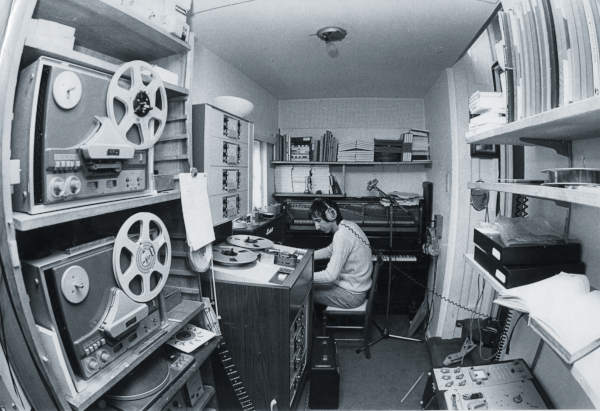
Stymied by the lack of input from his bandmates Townshend’s demos may be, but they’re of pretty astonishing quality for home recordings from 1970 – this definitely isn’t the charmingly ramshackle, lo-fi world of Paul McCartney’s first solo album – and, moreover, the songs were clearly pouring out of him. For every throwaway like the charming but lightweight country pastiche ‘Time Is Passing’, there’s something that suggests that Glyn Johns’ cut-to-the-bone approach to Who’s Next’s tracklisting necessitated the loss of some genuinely fantastic songs. There may well be a double album’s worth of strong material among the demos that never made it further than Townshend’s Eel Pie home and the songs subsequently scattered through b-sides and compilations, and collected on another of the box set’s CDs – ‘Greyhound Girl’, ‘Pure And Easy’, ‘Water’, ‘Let’s See Action’, ‘Naked Eye’, ‘Too Much Of Anything’, ‘When I Was A Boy’, every one of them presumably a reason for Life House’s failure to niggle at Townshend.
Who’s Next was all muscle and power, an album to face down a new decade
Alexis Petridis
Then again, a double album wouldn’t be Who’s Next, which, for all Townshend’s subsequent complaining about a compromise, was the perfect album for The Who to release in 1971: scrupulously fat-free, stripped of the kind of highfalutin’ ideas that had flourished in the wake of Sgt. Pepper, devoid of the cossetting morning-after-the-60s softness that had marked out a lot of 1970s big sellers, from Bridge Over Troubled Water to Tea For The Tillerman and Sweet Baby James – it was all muscle and power, an album built to face down a new decade. It’s here both in stereo (if it’s a new remaster, it doesn’t sound significantly different from the one released in the 2003 deluxe edition, which also included The Young Vic show in truncated form) and in a Steven Wilson Dolby Atmos mix. The 12-inch envelope of memorabilia is nicely-done: the repro programme from a 1971 gig at the Rainbow is a sweet period piece – complete with laudatory quotes from the recently-acquitted defendants in the Oz trial, and a feature on proggy country rockers Quiver, whose lank-haired bassist Bruce Thomas would re-emerge later in the decade, duly shorn, as one of Elvis Costello’s Attractions – the pop-art poster for the same gig is so lovely, it seems a shame most of them will remain folded in the box set, rather than on display. To say this stuff is for Who-obsessives only is both true and a little supererogatory: a 10CD box set retailing north of 200 quid clearly isn’t about attracting floating voters.
Perhaps the 11 discs and two books here represent the last word on Who’s Next, and – by extension – Life House. The plethora of previously unreleased tracks gives anyone who cares to the ability to construct their own version of what the lost album might have sounded like (an activity that seems perfectly in keeping with the Townshend’s early ’70s obsession with working in collaboration with his audience) while the 172-page graphic novel succeeds in distilling Townshend’s ideas into a workable plot: job finally done. Or perhaps not. Said workable plot could finally be turned into a feature film. The end product might look not unlike a superhero movie, albeit one with a downbeat ending, and there’s definitely a market for those in 2023. It’s something you can’t imagine has escaped Pete Townshend’s notice either. Life House finally laid to rest? You wouldn’t necessarily bet on it.
The Who’s Next / Life House box set is out today and was reviewed by Alexis Petridis.
Compare prices and pre-order

The Who
Whos Next - 10CD+blu-ray super deluxe
Compare prices and pre-order

The Who
Whos Next 4LP vinyl - album + san francisco gig

|
|
||||||||||||||||||||||||||||||||||||||||||||||||||||||||||||||||||
Compare prices and pre-order

The Who
Whos Next - 2CD edition

|
|
||||||||||||||||||||||||||||||||||||||||||||||||||||||||||||||||||
Compare prices and pre-order

The Who
Whos Next - single CD edition

|
|
||||||||||||||||||||||||||||||||||||||||||||||||||||||||||||||||||
Compare prices and pre-order

The Who
Whos Next - standard vinyl LP

|
|
||||||||||||||||||||||||||||||||||||||||||||||||||||||||||||||||||
Tracklisting
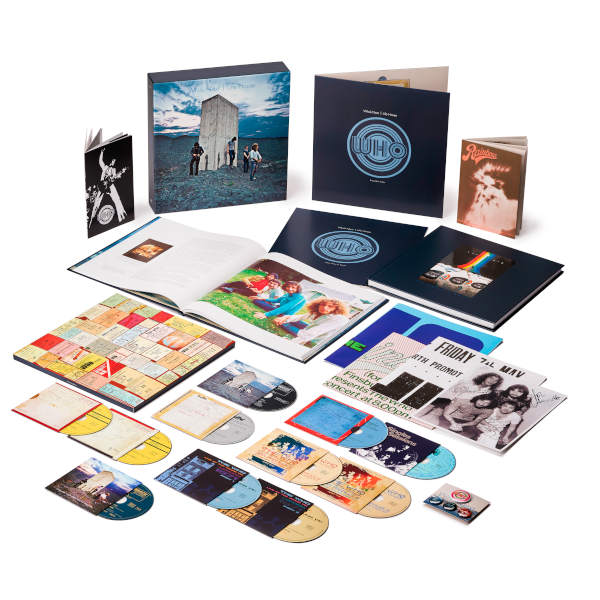
Who’s Next The Who /
-
-
CD 1: Who’s Next (remastered)
- Baba O’Riley
- Bargain
- Love Ain’t For Keeping
- My Wife
- The Song Is Over
- Getting In Tune
- Going Mobile
- Behind Blue Eyes
- Won’t Get Fooled Again
-
CD 2: PETE TOWNSHEND’S LIFE HOUSE DEMOS 1970 – 1971 – PART 1
- Teenage Wasteland (Demo)*
- Too Much (Demo) *
- Going Mobile (Demo)*
- There’s A Fortune in Those Hills (Demo)*
- Love Ain’t For Keeping (Demo)*
- Bargain (Demo)*
- Greyhound Girl (Demo)*
- Mary (Alternate Mix) (Demo)**
- Behind Blue Eyes (Demo)*
- Time Is Passing (Demo)*
- Finally, Over (Demo)**
- Baba O’Riley (Original Demo)**
* Previously released with new remix
** Previously unreleased tracks -
CD 3: PETE TOWNSHEND’S LIFE HOUSE DEMOS 1970 – 1971 – PART 2
- Pure And Easy (Home Studio Mix) (Demo)*
- Getting In Tune (Alternate Mix) (Demo)**
- Nothing Is Everything (Let’s See Action) (Demo)*
- Won’t Get Fooled Again (Demo)*
- Baba O’Riley (Demo)*
- Song Is Over (2021 Remix) (Demo)**
- Pure And Easy (Olympic Studios Mix) (Demo)**
- Mary (Original Mix) (Demo)*
- Baba O’Riley (First Editing Demo)**
- Song Is Over (Original Demo)*
* Previously released with new remix
** Previously unreleased tracks -
CD 4: RECORD PLANT, NYC SESSIONS MARCH 1971
- Don’t Do It (aka Baby Don’t You Do It) [Take 2, Unedited, March 16, 1971]**
- Won’t Get Fooled Again [Take 13, March 16, 1971]*
- Behind Blue Eyes (Version 1) [Take 15, March 16, 1971]**
- Love Ain’t For Keeping [Take 14, March 17, 1971]*
- The Note (aka Pure and Easy) [Take 21, March 17, 1971]*
- I’m In Tune (aka Getting in Tune) [Take 6, March 18, 1971*
- Behind Blue Eyes (Version 2) [Take 10, March 18, 1971}*
* Previously released with new remix
** Previously unreleased tracks -
CD 5: OLYMPIC SOUND STUDIOS, LONDON SESSIONS 1970-72
- Pure And Easy*
- I Don’t Know Myself [B-side with Unreleased Count-in]
- Time Is Passing [Stereo Mix]**
- Too Much of Anything [Original 1971 Vocal]**
- Naked Eye [1971 Remake]**
- Bargain (Early Mix)**
- Love Ain’t For Keeping (Unedited Mix)**
- My Wife (Unedited Mix)**
- Getting In Tune (Take 1 with Jam)**
- Going Mobile (Alternate Mix)**
- Song Is Over (Backing Track) [with Nicky Hopkins]**
- When I Was a Boy**
- Let’s See Action (Unedited Mix)**
- Relay (Unedited Mix) [Alternate Vocal]**
- Put The Money Down [Remix with Original Vocal]*
- Join Together [Unedited Remix]**
* Previously released with new remix
** Previously unreleased tracks -
CD 6: SINGLES & SESSIONS 1970-72
- The Seeker (Original Single Mix)
- Here For More [Original Single Mix]
- Heaven And Hell [New Stereo Mix]**
- Water [Eel Pie Sound Studio – New Unedited Mix]**
- I Don’t Know Myself [Eel Pie Sound Studio – New Unedited Mix]**
- Naked Eye [Eel Pie Sound Studio – New Unedited Mix]**
- Postcard [Eel Pie Sound Studio – Original 1970 Mix]**
- Now I’m A Farmer [Eel Pie Sound Studio – New Remix]**
- The Seeker (Unedited Version)**
- Water (IBC Version)**
- I Don’t Know Myself (IBC Version)**
- Let’s See Action (Original Single Mix)
- When I Was a Boy (Original Single Mix)
- Join Together (Original Single Mix)
- Relay (Original Single Mix)
- Waspman (Original Single Mix)
- Long Live Rock (Original Olympic Mix)
* Previously released with new remix
** Previously unreleased tracks -
CD 7: LIVE AT THE YOUNG VIC, LONDON – APRIL 26, 1971
- Love Ain’t for Keeping*
- Pure And Easy*
- Young Man Blues*
- Time Is Passing*
- Behind Blue Eyes*
- I Don’t Even Know Myself*
- Too Much of Anything*
- Getting In Tune*
- Bargain*
* Previously released with new remix
** Previously unreleased tracks -
CD 8: LIVE AT THE YOUNG VIC, LONDON – APRIL 26, 1971
- Pinball Wizard**
- See Me, Feel Me**
- Baby Don’t You Do It*
- Water*
- My Generation*
- (I’m A) Road Runner*
- Naked Eye*
- Bony Moronie*
- Won’t Get Fooled Again*
* Previously released with new remix
** Previously unreleased tracks -
CD 9: LIVE AT THE CIVIC AUDITORIUM, SAN FRANCISCO – DECEMBER 12, 1971
- Introduction**
- I Can’t Explain*
- Substitute*
- Summertime Blues**
- My Wife*
- Baba O’Riley**
- Behind Blue Eyes*
- Bargain*
- Won’t Get Fooled Again**
- Baby Don’t You Do It*
- Magic Bus**
* Previously released with new remix
** Previously unreleased tracks -
CD 10: LIVE AT THE CIVIC AUDITORIUM, SAN FRANCISCO – DECEMBER 12, 1971
- Introduction To Tommy**
- Overture**
- Amazing Journey**
- Sparks**
- Pinball Wizard**
- See Me Feel Me**
- My Generation**
- Naked Eye*
- Going Down*
* Previously released with new remix
** Previously unreleased tracks -
Blu-ray Audio
Steven Wilson Atmos Mix (48kHz 24-bit)**
Steven Wilson 5.1 Mix (96kHz 24-bit)**
Steven Wilson Stereo Mix (96kHz 24-bit)*
Original 1971 Stereo Mix (96kHz 24-bit)- Baba O’Riley
- Bargain
- Love Ain’t For Keeping
- My Wife
- The Song Is Over
- Getting In Tune
- Going Mobile
- Behind Blue Eyes
- Won’t Get Fooled Again
Bonus Tracks: Steven Wilson Atmos Mix (48kHz 24-bit) & Steven Wilson 5.1 Mix (96kHz 24-bit), Steven Wilson Stereo Mix (96kHz 24-bit)*
- The Seeker (Unedited Version)**
- Here For More*
- Now I’m A Farmer**
- I Don’t Know Myself (Eel Pie Sound Version)**
- Water (IBC Version)**
- Naked Eye (Olympic Sound Version)**
- Pure And Easy**
- Too Much of Anything**
- Let’s See Action**
- When I Was a Boy**
- Join Together (Unedited Version)**
- Put The Money Down**
- Relay (Unedited Version)**
- Long Live Rock**
-
CD 1: Who’s Next (remastered)

 Reviews
Reviews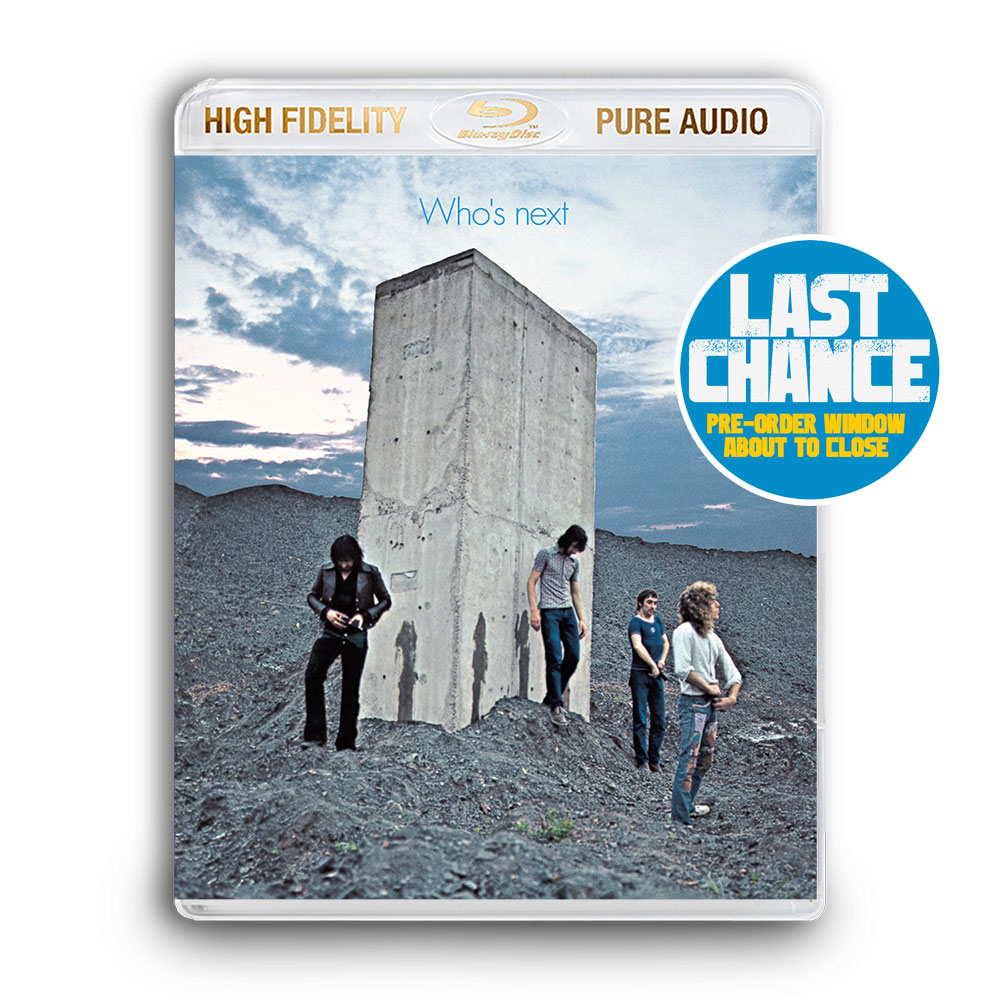
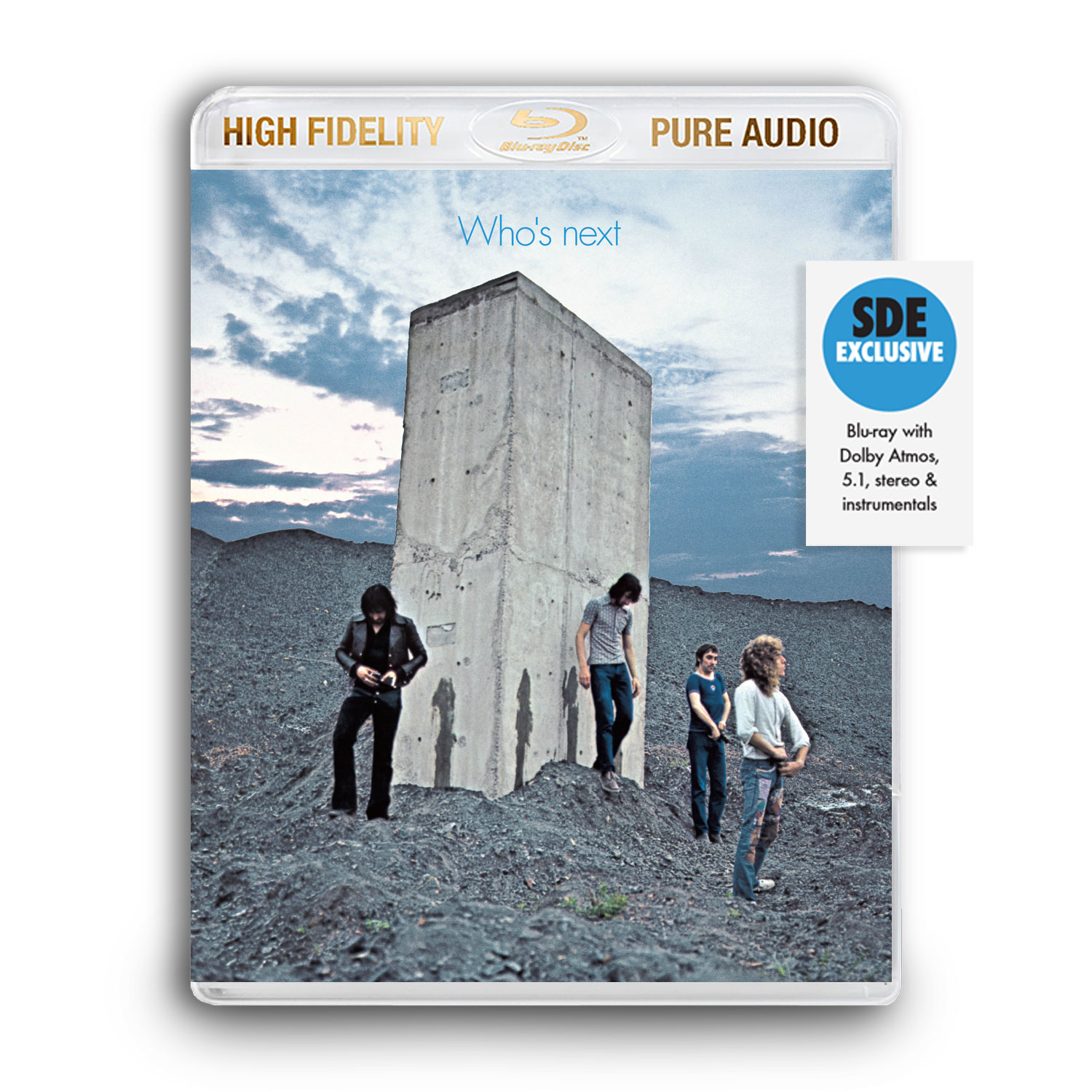
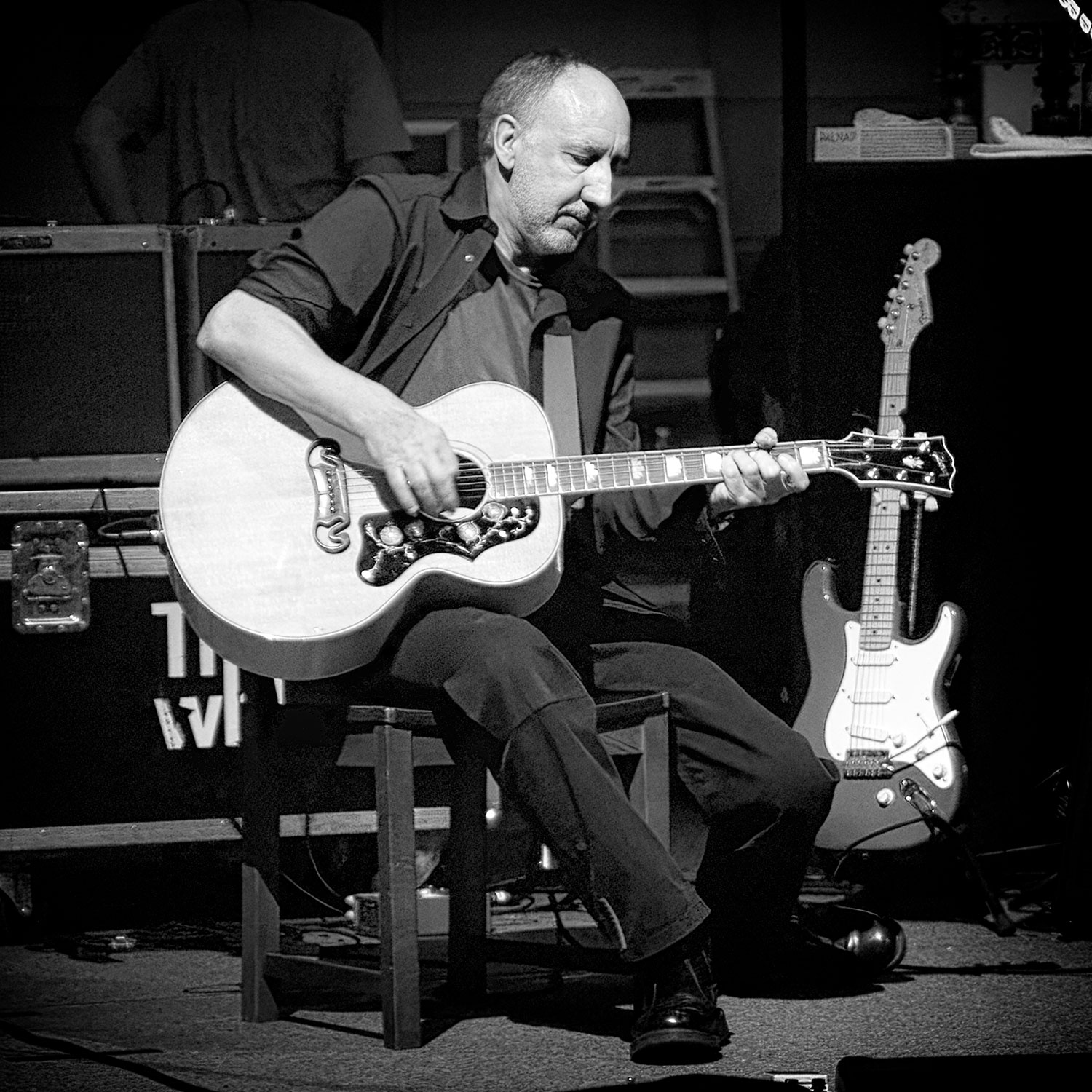
 Interview
Interview
By Paul Sinclair
63